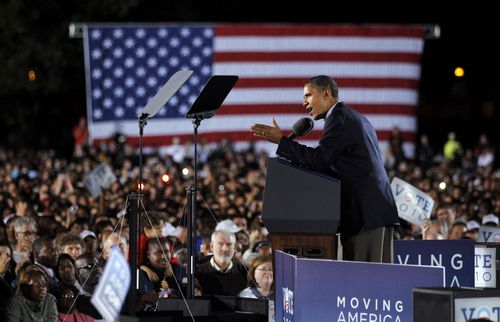Asia-Pacific
Obama targets key groups in election's homestretch
(Agencies)
Updated: 2010-10-18 10:11
 |
Large Medium Small |
|
 US President Barack Obama campaigns for Ohio Governor Ted Strickland at a midterm election campaign rally at Ohio State University in Columbus, Ohio, October 17, 2010.[Photo/Agencies] |
COLUMBUS, Ohio - President Barack Obama is targeting key Democratic constituencies as he tries to energize voters and build up Election Day turnout among supporters who helped him win the White House: young people, African-Americans and women.
A crucial element of the president's strategy in the weeks before the November 2 Congressional and state gubernatorial elections is finding a way to get first-time voters from 2008 to head back to the polls even though Obama's name isn't on the ballot this time.
But a new Associated Press Poll shows that may be too little, too late.
The survey found that the coalition of voters that swept Obama into the White House just two years ago _ aching for change after the eight-year presidency of Republican George W. Bush _ has crumbled. With Obama not on the ballot again until 2012, dispirited supporters are unlikely to hold back a growing Republican and conservative tea party tide.
It's a wide enthusiasm gap that's buoying Republicans, who are poised for big electoral gains, and worrying Democrats, who are seeking to hang onto majorities in Congress as well as among governors. Obama's party hopes its superior get-out-the-vote operation, updated from his groundbreaking campaign, can overcome Republicans' energized supporters to mitigate expected losses across the board.
Obama isn't shying away from reality: The sputtering economy has created a tough political environment for Democratic candidates.
"When times are that difficult, elections are going to be difficult and understandably so," Obama said Sunday while speaking at a fundraiser for Ohio Gov. Ted Strickland at a private home outside Cleveland.
Later, joined by first lady Michelle Obama told a crowd of some 35,000 people gathered at Ohio State University that Republicans are trying to ride Americans' frustration with the economy to success in the midterm elections, counting on voters "forgetting who caused the mess in the first place."
The president acknowledged there are people "hanging by a thread," but said Republicans have only offered the "philosophy that nearly destroyed our economy."
The president and first lady have campaigned individually for Democratic candidates in the final weeks before the midterms, but Sunday marked the first time the Obamas had campaigned together since the presidential election.
Sunday's rally at Ohio State is one of five the president is scheduled to attend ahead of Election Day, all designed to remind the Democratic base of the enthusiasm Obama inspired during his presidential campaign.
The five rallies are all in states Obama won during his presidential bid, and all in states with competitive midterm races: Wisconsin, Pennsylvania, Ohio, California and Nevada. Though Democratic officials say the president is casting a wide net and trying to reach the whole of the Democratic Party, some rallies do target specific constituencies.
In Madison, Wisconsin, late last month, Obama targeted young voters at the University of Wisconsin. Officials hoped last week's rally in Philadelphia reached African-Americans, many of whom came to the polls for the first time in 2008 to support Obama. Democratic candidates like Pennsylvania Senate hopeful Joe Sestak need high turnout in urban areas like Philadelphia if they're to overcome stiff Republican opposition.
At an event Thursday in Seattle, Obama will focus on how the economic crisis has affected women. White House deputy communications director Jen Psaki said Obama will argue that women who may have benefited from administration initiatives like the small business lending program would suffer under Republican leadership.
Obama is also using backyard meetings and televised town halls, including one broadcast on MTV, BET and CMT last week.
White House officials insist the president's coast-to-coast campaigning is making a difference.
"There's an excitement about what this president is trying to do. There's an energy around it," Obama spokesman Robert Gibbs said Sunday on NBC's "Meet the Press."
But polls suggest Obama's winning coalition from 2008 is crumbling. About one-quarter of those who voted for Obama are voting Republican in November or are considering doing so, according to an Associated Press-Knowledge Networks poll.
Equally as dispiriting for the White House: Just half of Obama voters say they'll definitely show up to vote November 2, while two-thirds of those who voted for Republican John McCain in the 2008 presidential election say they're certain to vote.
Democratic officials say the president is still the best messenger to encourage his party to get to the polls. Following three straight days of events in Delaware, Massachusetts and Ohio, Obama heads West for stops in Portland, Oregon, on Wednesday, Seattle and San Francisco on Thursday, Los Angeles and Las Vegas on Friday and Minneapolis on Saturday.
Obama probably will spend Election Day in Washington, and has requested an absentee ballot to vote in his home state of Illinois.



